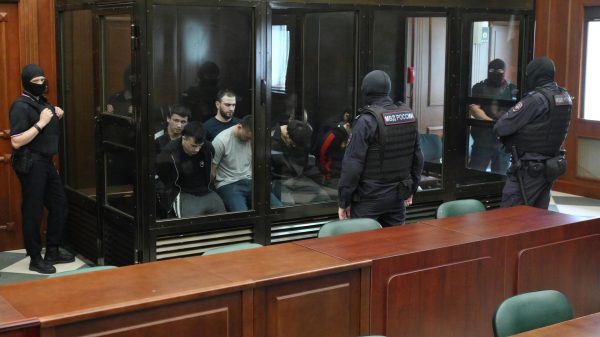 The 2021 European Championship final between England and Italy at Wembley was turned into a nightmare by frenzied fans. Photo: Reuters/Lee Smith
The 2021 European Championship final between England and Italy at Wembley was turned into a nightmare by frenzied fans. Photo: Reuters/Lee Smith
Even a road once paved with broken glass can lead to a golden destination. To walk out into the ruins of that night at Wembley two years ago, after English football's greatest event since 1966 had devolved into a cocaine-fuelled hell, was to wonder whether there would ever be a chance of redemption. Any authority to stage another tournament of this magnitude looked frayed and in tatters. But now, 821 days later, forgiveness has triumphed.
With UEFA awarding Euro 2028 to Great Britain and Ireland, England, as the host nation of the majority of matches, can project an image that goes beyond drugs, violence and unspeakably located flare-ups in Leicester Square.
p>
p>
This is the rarest moment in the game, a day of uncomplicated joy. Although there was ultimately no danger — Turkey, having agreed to an uncontested joint bid with Italy in 2032, took care of that — the decision sparked jubilation in London and Dublin, not to mention Cardiff, Glasgow and Belfast.
A spirit of goodwill throughout the country? Not really. No sooner had Rishi Sunak posed alongside Harry Kane and Gareth Southgate to declare: “We have the euro” than the Scottish adviser accused him of being too Anglocentric.
For once, it would be helpful if such minor points were put aside. Euro 2028 will be the biggest celebration of football on these islands in 32 years, an antidote to all those stubborn portrayals of Britain as the sick man of Europe.
Thoughts cannot help but return to July 6, 2005, the day London won the right to host the 2012 Olympic Games. The images are seared into the memory: David Beckham in his cream suit scattering stardust among IOC delegates in Singapore, Trafalgar Square erupting as Jacques Rogge announced the name inside the envelope. Optimism rushed in like a tide.
Few realized that the next day the capital would be engulfed in the darkness of terrorism: four coordinated suicide bombings killed 52 people. It was a vivid illustration of how quickly even the simplest pleasures can be poisoned. So yes, it might be easy to throw barbs at Euro 2028, wonder how much it will all cost and whether England might regret insisting they want to qualify for their own party. But this kind of glass-half-empty thinking risks looking crude. The lesson from London's Olympic delight and what happened next is to save the victories while you can.
After the events of July 11, 2021, any thought of the euro returning to the UK seemed fanciful. It was only thanks to Michel Platini and his arrogant vision of a pan-continental tournament that Wembley had the honor of hosting the final at all. As a result, once England had booked their place it was an absolute disgrace.
The official report presented this evening is quite chilling: it describes how a horde of 6,000 thugs beat up police officers, knocked down a young girl and sent one man into a fit by trampling him. I have personal memories of a crowd invading the disabled section, climbing over a ventilator with a breathing apparatus. As an image that needed to be conveyed to the world, it was unspeakably dark.
 The area around Wembley Stadium looked like a war zone on the night of the 2021 European Championship final. Photo: Reuters/Lee Smith
The area around Wembley Stadium looked like a war zone on the night of the 2021 European Championship final. Photo: Reuters/Lee Smith
Yet UEFA is confident that these fresh wounds have healed. Why else would Wembley see fit to stage the final and both semi-finals for the second time in seven years? At the time, it seemed that England, either because of the penalty defeat to Italy or the dreaded specter of hooliganism, had missed the opportunity of a lifetime. It was just a quirk of fate in the form of pandemic travel restrictions that allowed Southgate's side to play six of their seven games on home soil. Now, remarkably, they have the luxury of doing it again.
In fact, the «Age of Gareth» will likely end by 2028. Of England's 2021 headliners, Jude Bellingham is best suited to star in both films. It's an exciting thought that this generation of midfield talent will have played in two World Cups and two European Championships in their home country by the age of 25. Even for a player of his prodigious ability, these are gilded days.
It was tempting recently to wonder whether Great Britain or Ireland could even muster the will for such a bid. The terrible memories of past humiliations, not least the two votes England received in their attempt to secure the 2018 World Cup, have been traumatic.
Against this backdrop, success in 2028 should reignite new confidence. Yes, the bidding process involves costs and unnecessary protocol. And yes, any suggestion of a home World Cup this side of 2050 is unlikely given the event's inexorable shift towards acquiring Gulf states. But the reward of home euros is a timely reminder that traditional gaming options are not doomed to obsolescence just yet.
UEFA has entrusted Great Britain and Ireland with the coveted prize. This is an achievement that can baffle cynics and should not be rejected under any circumstances.






















































Свежие комментарии